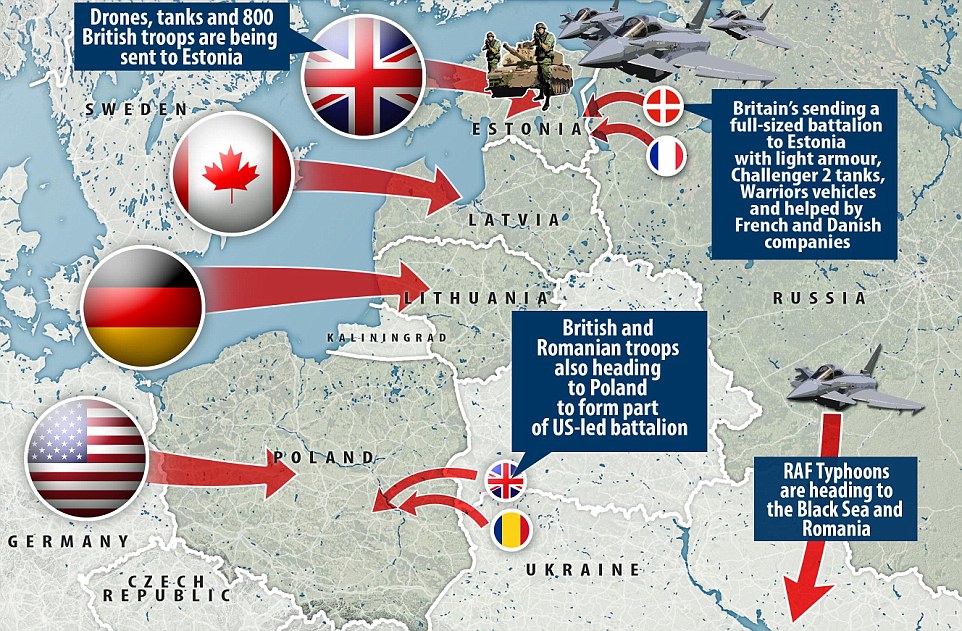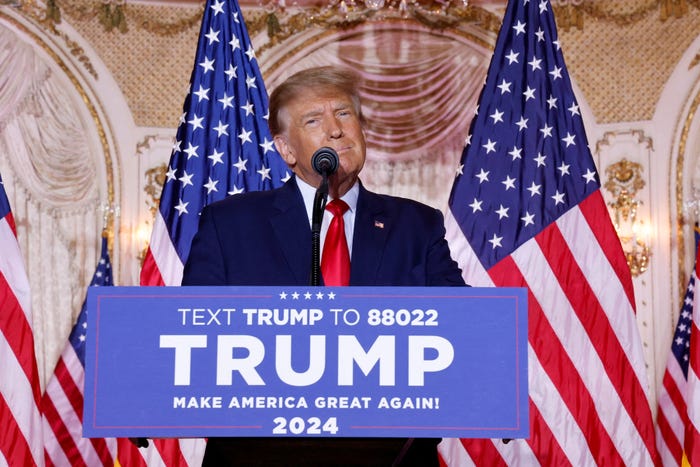Ukraine's Future In NATO: Trump's Reservations Explained

Table of Contents
Trump's Concerns about Burden Sharing
Trump consistently criticized NATO allies for insufficient financial contributions to the alliance's defense budget. He argued that this "burden-sharing" issue extended to potential future members, implying that Ukraine, already facing significant economic challenges, might be an undue financial burden on the alliance.
Financial Contributions
- Trump's emphasis on "fair burden-sharing" implied a reluctance to welcome members who he perceived as unable to contribute adequately to collective defense. This concern was frequently voiced in relation to other NATO members as well, but it was particularly relevant in the context of Ukraine's application.
- This concern highlighted a broader skepticism towards expanding NATO without ensuring the financial commitment of all members. The perceived financial instability of Ukraine, coupled with its ongoing conflict, raised questions about its ability to meet its financial obligations to the alliance.
Military Readiness
Beyond financial contributions, Trump also raised questions about Ukraine's military readiness and its capacity to meet NATO's rigorous standards for membership. The ongoing conflict in eastern Ukraine, and the country's overall military capacity, were frequently cited as concerns.
- He pointed to ongoing conflicts and internal challenges within Ukraine as potential obstacles to its integration into the alliance. The ongoing war with Russia, and the need for significant military modernization, were presented as major hurdles.
- This concern underscored the importance of military preparedness as a prerequisite for NATO membership, a factor Trump deemed insufficient in Ukraine's case. The argument was that admitting a militarily weak state could undermine NATO's collective defense capabilities.
Geopolitical Considerations and Russia
Trump expressed apprehension that Ukraine's NATO membership would provoke a strong and potentially dangerous reaction from Russia, leading to increased regional instability. This concern stemmed from the historically fraught relationship between Ukraine and Russia, and the strategic importance of Ukraine's location.
Escalation of Tensions with Russia
- He suggested that rapid NATO expansion could be perceived as an aggressive act by Russia, potentially triggering military escalation. This reflected a fear of provoking a larger conflict with Russia.
- This reflects a pragmatic approach that prioritizes avoiding direct confrontation with Russia, even at the expense of potentially delaying Ukraine's NATO aspirations. The avoidance of direct conflict with Russia was a recurring theme in Trump's foreign policy.
Focus on Bilateral Relations
Trump’s foreign policy often prioritized bilateral agreements over multilateral alliances. He may have viewed direct negotiations with Russia as a more effective approach to resolving the Ukraine conflict than NATO membership.
- This perspective prioritized a transactional approach to international relations, potentially overshadowing the security benefits of NATO membership for Ukraine. The focus on bilateral deals might have been seen as a more efficient way to manage the conflict.
- The emphasis on bilateral negotiations might have been seen as a less confrontational strategy compared to expanding NATO’s reach closer to Russia's borders. This approach aimed to avoid escalating tensions with Russia by bypassing the multilateral framework of NATO.
Domestic Political Factors
Trump's reservations on Ukraine's NATO membership could also be interpreted through the lens of his domestic political strategy. His populist appeal often included skepticism towards established international institutions and alliances.
Populist Appeal
- Criticizing NATO expansion might have resonated with segments of his electorate who shared similar anti-establishment sentiments. This resonates with Trump's broader populist message of questioning established norms.
- This suggests that domestic political considerations played a role in shaping Trump's stance on Ukraine's NATO aspirations. His domestic political base may have influenced his foreign policy decisions.
Russia's Influence
Some analysts have suggested that Trump's stance was influenced, at least indirectly, by Russia's efforts to undermine NATO cohesion and influence American foreign policy. This is a controversial point requiring further investigation.
- This is a controversial point and requires further investigation, but it highlights the potential influence of foreign actors on American decision-making processes. The possibility of Russian interference needs to be carefully considered.
- Understanding these dynamics is essential to fully grasp the complex interplay of domestic and international factors in shaping U.S. foreign policy towards Ukraine. A comprehensive understanding requires analyzing both domestic and international influences.
Conclusion
Trump's reservations regarding Ukraine's NATO membership stemmed from a complex interplay of concerns about burden-sharing, geopolitical implications, and potentially domestic political factors. While his concerns about financial contributions and the potential for escalating tensions with Russia were understandable, his approach often sidelined the crucial security benefits that NATO membership could offer Ukraine. Understanding these reservations is essential for navigating the ongoing debate about Ukraine's future and its relationship with the West. Further analysis of Ukraine's NATO membership prospects, considering both the Trump administration’s legacy and the evolving geopolitical landscape, remains crucial. For a more in-depth understanding of this critical issue, continue researching Ukraine's NATO membership and its implications.

Featured Posts
-
 Golds Record High Understanding The Trade War Impact On Bullion
Apr 26, 2025
Golds Record High Understanding The Trade War Impact On Bullion
Apr 26, 2025 -
 Trumps Stance On Banning Congressional Stock Trading Key Takeaways From Time Interview
Apr 26, 2025
Trumps Stance On Banning Congressional Stock Trading Key Takeaways From Time Interview
Apr 26, 2025 -
 Elon Musks Private Companies A Side Hustle Opportunity For Select Investors
Apr 26, 2025
Elon Musks Private Companies A Side Hustle Opportunity For Select Investors
Apr 26, 2025 -
 Point72s Exit From Emerging Markets Focused Pod
Apr 26, 2025
Point72s Exit From Emerging Markets Focused Pod
Apr 26, 2025 -
 Stock Market Analysis Dow Futures Chinas Economic Policies And Tariff Impacts
Apr 26, 2025
Stock Market Analysis Dow Futures Chinas Economic Policies And Tariff Impacts
Apr 26, 2025
